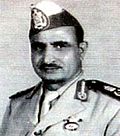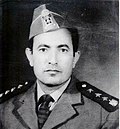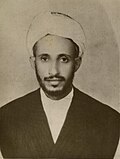No. Portrait Name(Birth–Death) Term start Term end Political party 1 Abdullah al-Sallal عبد الله السلال (1917–1994) [ 1]
28 September 1962 26 April 1963 Military 2 Abdul Latif Dayfallah عبد اللطيف ضيف الله (1930–2019)
26 April 1963 5 October 1963 Military 3 Abdul Rahman al-Iryani عبد الرحمن الإرياني (1908–1998)
5 October 1963 10 February 1964 Independent 4 Hassan al-Amri حسن العمري (1920–1989)
10 February 1964 29 April 1964 Military 5 Hamoud al-Gayifi حمود الجائفي (1918–1985)
29 April 1964 6 January 1965 Independent (4) Hassan al-Amri حسن العمري (1920–1989)
6 January 1965 20 April 1965 Military 6 Ahmad Muhammad Numan أحمد محمد نعمان (1909–1996)
20 April 1965 6 July 1965 Independent (1) Abdullah al-Sallal عبد الله السلال (1917–1994) [ 1]
6 July 1965 21 July 1965 Military (4) Hassan al-Amri حسن العمري (1920–1989)
21 July 1965 18 September 1966 Military (1) Abdullah al-Sallal عبد الله السلال (1917–1994) [ 1]
18 September 1966 5 November 1967 [ 2] Military 7 Mohsin Ahmad al-Aini محسن أحمد العيني (1932–2021)
5 November 1967 21 December 1967 Independent (4) Hassan al-Amri حسن العمري (1920–1989)
21 December 1967 9 July 1969 Military — Abdul Salam Sabrah عبد السلام صبره (1912–2012) Acting Prime Minister
9 July 1969 29 July 1969 Independent (7) Mohsin Ahmad al-Aini محسن أحمد العيني (1932–2021)
29 July 1969 2 September 1969 Independent 8 Abdullah Kurshumi عبد الله كرشمي (1932–2007)
2 September 1969 5 February 1970 Independent (7) Mohsin Ahmad al-Aini محسن أحمد العيني (1932–2021)
5 February 1970 26 February 1971 Independent — Abdul Salam Sabrah عبد السلام صبره (1912–2012) Acting Prime Minister
26 February 1971 3 May 1971 Independent (6) Ahmad Muhammad Numan أحمد محمد نعمان (1909–1996)
3 May 1971 24 August 1971 Independent (4) Hassan al-Amri حسن العمري (1920–1989)
24 August 1971 5 September 1971 Military — Abdul Salam Sabrah عبد السلام صبره (1912–2012) Acting Prime Minister
5 September 1971 18 September 1971 Independent (7) Mohsin Ahmad al-Aini محسن أحمد العيني (1932–2021)
18 September 1971 30 December 1972 Independent 9 Kadhi Abdullah al-Hagri القاضي عبدالله الحجري (1911–1977)
30 December 1972 10 February 1974 Independent 10 Hassan Muhammad Makki حسن محمد مكي (1933–2016)
10 February 1974 22 June 1974 [ 3] Independent (7) Mohsin Ahmad al-Aini محسن أحمد العيني (1932–2021)
22 June 1974 16 January 1975 Independent — Abdul Latif Dayfallah عبد اللطيف ضيف الله (1930–2019) Acting Prime Minister
16 January 1975 25 January 1975 Military 11 Abdul Aziz Abdul Ghani عبد العزيز عبد الغني (1939–2011)
25 January 1975 15 October 1980 Independent 12 Abd Al-Karim Al-Iryani عبد الكريم علي يحي محمدعبد ألله الإرياني (1934–2015)
15 October 1980 24 August 1982 Independent (12) 24 August 1982 13 November 1983 General People's Congress (11) Abdul Aziz Abdul Ghani عبد العزيز عبد الغني (1939–2011)
13 November 1983 22 May 1990 General People's Congress 









